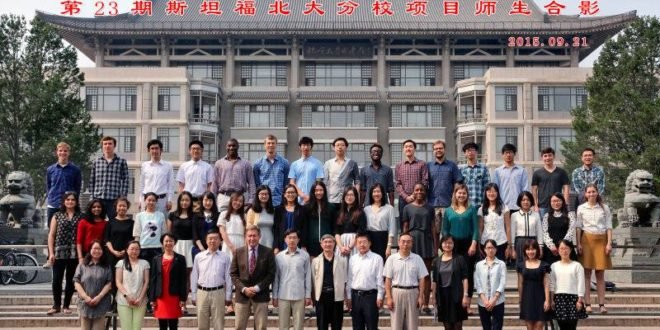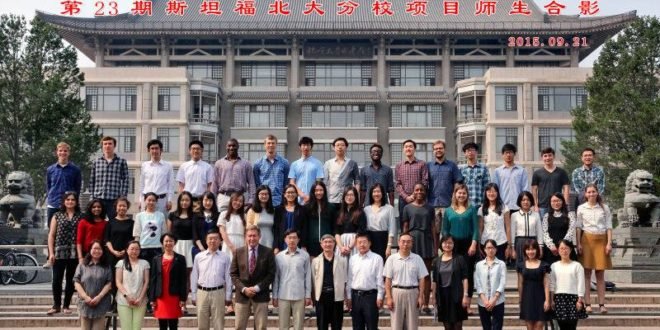Stanford Closes Beijing Study Abroad Program, Enrollments Down at Other Beijing-Based Centers
News that Stanford University will shutter its undergraduate overseas studies program in Beijing has focused attention on the future of the city as a destination for US students studying abroad.
I have worked in the study abroad industry here in Beijing for over a decade, both as an instructor and as an administrator. Recently, there has been a lot of soul searching at study abroad centers around Beijing about why numbers at so many programs have fallen dramatically when compared to just a few years earlier. Some of the reasons seem obvious. The 2008 Olympics generated a lot of buzz for China and Beijing and, for a few years, China was the place to be. Dozens of new programs opened in Beijing and around China by universities and independent study abroad providers in the United States eager to get in on the trend.
Some of the reasons seem obvious. The 2008 Olympics generated a lot of buzz for China and Beijing and, for a few years, China was the place to be. Dozens of new programs opened in Beijing and around China by universities and independent study abroad providers in the United States eager to get in on the trend.
In November 2009, President Barack Obama announced the “100,000 Strong” initiative, a national effort designed to dramatically increase the number and diversify the composition of American students studying in China.
The number of US students studying in China peaked in the Academic Year 2011-2012. That year, there were 14,887 students from US-based colleges and universities studying in China, according to the Institute for International Education. But since 2012, those numbers have fallen 14 percent in just three years.

Olympic fever passed. Now when China makes the news, parents, school administrators and prospective students see pictures of masked urbanites trudging through pollution rather than young athletes running through a glittering stadium. Other cities have replaced Beijing as the destination of the moment and enrollments have suffered.
One current director of a US study abroad program based in Beijing, who, because of the subject asked not to be identified, told me that enrollments at his center were down 20-25 percent compared to four years ago.
Greater public awareness and media scrutiny of Beijing’s air pollution problem, while a good thing for the city’s residents and visitors, have made Beijing synonymous with toxic air in the minds of many parents, students, and school administrators worldwide.
There are also more opportunities for studying in China in locations other than Beijing. In addition to US-based study abroad company CET (which has had a long-running successful language program based in Harbin) and the Johns Hopkins University (which opened its post-graduate Hopkins-Nanjing Center in that city in 1988), centers and programs have opened in Kunming, Nanjing, Hangzhou, Xi’an, and even Hainan over the past decade.
“One obvious pressure is pollution. Students can choose between programs in other Chinese or Chinese-speaking cities. Their parents watch the news, and they don’t want their children going to Beijing," said one director.
Trends in US higher education have also affected enrollment in traditional study abroad programs. Many majors have specific requirements for classes and credits which are difficult to earn overseas. With higher tuitions and concerns about student loan debt, parents and students weigh the costs of a semester abroad both regarding finances and academic progress.
Alyssa Farrelly is the Executive Director of Project Pengyou, a Beijing-based organization which aims to increase interactions between Chinese and American students and build bridges between the United States and China. According to Farrelly, what students are seeking from study abroad programs in China has shifted over time from cultural/language-based style programs to more tailored programs that attract other types of majors including business, science, technology, engineering, and mathematics.
"If traditional programs aren't changing with the times, they will likely see a continued decrease in enrollment. Students now are looking for internships and building practical skills. They view studying abroad as an investment toward their future career," says Farelly.
One director of an international study abroad program in Beijing also blamed some of the decline in their enrollments on the Confucius Institutes, which offer generous scholarships to overseas students looking to study in China. These scholarships generally require students to enroll directly in a Chinese university program and cannot be used by students studying through an international company or organization.
"Free ticket, free housing, and free tuition. The quality of instruction, especially for English-language courses may be less, but that's hard to pass up," he said.
One area of growth has been shorter-term programs, where students and faculty travel to a series of destinations over the course of a few weeks or months. While such programs lack the immersive quality of semester- or year-long programs, the lower costs and shorter schedules give opportunities to go abroad to many students, including those who might not be able to study overseas for a semester or longer.
In response, many of the major US study abroad organizations and companies operating in Beijing are expanding their offerings for short-term or “customized” programming in China.
Some summer programs are also seeing steady numbers. Both the Harvard Summer Program and the longtime stalwart Princeton in Beijing have enjoyed robust enrollments for their language-intensive summer sessions.

Two high profile post-graduate programs with deep pockets, the Yenching Scholars, which opened at Peking University in 2015, and the Schwarzman Program at Tsinghua University which welcomed its first cohort this past Fall, have also had little trouble attracting applicants.
While declining numbers for many established long-term programs in Beijing are a cause for concern, there will always be students out there interested in studying in the city despite its challenges.
Farelly wonders if Beijing programs might consider rebranding to respond to new ideas of what it means to study in China. "For example the number of students enrolling in Shanghai programs seems more stable. Shanghai tends to attract more of the business-minded students looking for opportunities to work in China," says Farrelly.
This semester, I have 15 undergraduates from the US in my Late Imperial China class. It’s a good number, and most of them are here because they want to be in China. That’s one reason I love teaching here. Beijing is a tough place to study and those students who come here are generally a self-selection of China geeks like me. They could have gone to Costa Rica, Barcelona, or Australia, somewhere with a beach and a decent internet connection. Instead, my students are here. Studying in Beijing. In January. I love that.
Photos: standford.edu, Jeremiah Jenne, The Stanford Daily, tsinghua-university







